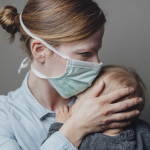About 15% of women suffer from perinatal depression — depression which emerges during pregnancy or the postpartum period; however, most women with perinatal depression do not receive any type of treatment. While we have made huge strides in increasing awareness of postpartum mental health issues, there are still significant obstacles to obtaining treatment. Especially in more remote areas, women are often not able to find appropriately trained care providers or must wait for months to see a specialist. To make matters worse, their insurance might not cover or they might not be able to afford the treatment offered by specialists with training in perinatal mental health. They may not have reliable childcare and therefore might not be able to attend to their own appointments on a regular basis. Or they may simply be too depressed or anxious to leave their homes.
So how can we help these women?
Here we might be able to learn a little bit from India, a country with big mental health issues but where there is only one psychiatrist for every every million people. A recent study explored a new strategy for delivering treatment to patients with depression. Obviously India is different from the United States in so many ways, but this intervention specifically designed to deliver treatment to people with mental health issues who cannot access care, could be modified and might prove to be quite useful for supporting and delivering care to pregnant and postpartum women who are not able to access mental health services.
Sangath is a nonprofit healthcare organization headquartered in Goa whose mission is to improve access to health by recruiting and relying upon community resources. In The Lancet, Vikram Patel and colleagues reported on a study from Sangath which used a brief psychological intervention delivered to male and female patients with depression. What makes this study different (and so exciting) is that instead of using mental health providers, the program relied on people from the community to be lay counselors. These providers had at least a tenth grade level of education but had never received any formal mental health training. They attended a three-week session led by mental health professionals, where they learned about depression and were given some basic skills in cognitive behavioral therapy.
In a primary care setting, 495 men and women with moderately severe to severe depression were identified using the Patient Health Questionnaire 9 (PHQ-9) and were randomly assigned to receive either usual care or usual care plus the Healthy Activity Program (HAP). Borrowing from psychotherapeutic interventions that have been demonstrated to be effective for the treatment of depression, HAP consisted of four strategies: (1) engagement, including psychoeducation of individual and family and treatment planning; (2) behavioral activation, including strategies for increasing activity, including physical exercise; (3) need-based strategies, such as identifying interpersonal triggers, problem-solving, relaxation techniques, and enlisting social supports according to the specific needs of the individual; and (4) social integration, promoting reintegration into the community.
Participants in the HAP group had significantly lower levels of depressive symptoms than those receiving usual care and experienced higher rates of remission from depression (64% versus 39% in the usual care group). In addition, those receiving the HAP intervention had lower rates of functional disability, fewer days of missed work, lower prevalence of intimate partner violence, and lower rates of suicidal thoughts and attempts.
The efficacy of the HAP intervention is comparable to other types of psychotherapy delivered by trained mental health professionals. That’s impressive, and it should also be noted that, while many studies assessing psychotherapeutic interventions primarily enroll participants with milder forms of depression, the men and women included in this study had moderately severe to severe depression.
Although these study was not specifically designed for women with perinatal depression, some of the strategies used in the HAP intervention focus on issues that are so central to the treatment of depressed pregnant and postpartum women: addressing the problems of social isolation, interpersonal conflicts, and inadequate social supports. Another important aspect of this intervention is that the treatment is delivered within the community by people who are part of that community.
Childbearing and parenting ideally takes place within a community, and for eons, women with young children have been able to rely on their families, friends, and neighbors to help them during these vulnerable, often bewildering, and sometimes difficult times. In our modern American society, we’re not so good at community. Daughters live far away from their mothers, families are smaller, and we are often too busy working to keep up with our friends and do not have the time to get to know our neighbors. When a woman hits a rough patch during pregnancy or after the birth of a child, who can she turn to? Ideally she would be able to reach out to others in her community for help. Unfortunately, mental health problems carry their own special brand of stigma, and most women in this situation are too ashamed to share their problems with others in their community.
Support from one’s community or peer support is vital to mental health and well-being, although many with psychiatric illness may find it difficult to find appropriate support in their community. Some programs, like the Visiting Moms Program here in Boston, rely on peer support to reach out to pregnant and postpartum women and have been very successful in reaching women with perinatal depression. Still, we do not have enough well-trained and well-funded community-based programs to help the millions of pregnant women and new mothers in the United State who struggle with perinatal depression. We can only hope that this study from India can help us to improve how we provide support and mental health services to an extremely vulnerable population.
Ruta Nonacs, MD PhD
Patel, V, Weobong, B, Weiss, HA et al. The Healthy Activity Program (HAP), a lay counsellor-delivered brief psychological treatment for severe depression, in primary care in India: a randomised controlled trial. Lancet 2016.








The use of lay counselors or community health workers has been a long standing tradition in Latin American and the Caribbean. All stemming from the tradition of being “comadres” or godmothers to others in need in the community. As providers we just need to be more culturally aware and humble to learn from each other, and from others that might look/talk different.